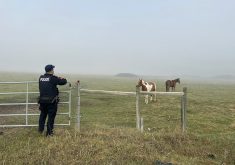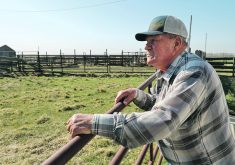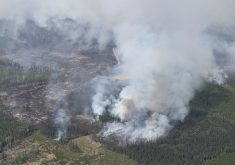Moving from big city life in Tehran to a cattle operation in central Alberta required Ala Hakim to make major adjustments
FORESTBURG, Alta. — When Ala Hakim moved from Tehran to Forestburg to be with her husband, Anders Oberg, she brought her enthusiasm, traditions and aunts.
The couple met in Dubai when they both worked in the oil industry. After years of commuting and meeting in countries around the world, the decision was made to move to the central Alberta farm.
Moving from a city of eight million people to a town of 1,000 in 2016 had its challenges.
“At first I was struggling a lot. I couldn’t understand why there is no dry cleaner around you. You have to drive one hour to get your clothes to the dry cleaner. Where I was born and grew up, you would just call and they would come pick up your clothes and bring them back. Of course, if you wanted to go anywhere you were at least two or three hours in the traffic,” said Hakim of her time in Tehran, the capital of Iran.
“It is a lot different living here. It has its difficulties, but it is worth it.”
Anders didn’t have plans to move back to Alberta to take over the family farm from his father and uncle, but the couple were tired of their long-distance relationship and wanted to establish a home.
“I didn’t really plan on coming back to the farm. It just happened. I finished my contract in Australia and came here for harvest and stayed ever since,” said Oberg.
His job took him around the world, which was fun when he was single, he added, but he wanted a home base after he was married.
The family farms about 6,000 acres with about 200 cows. Oberg’s parents and uncle live on farmyards close by. Oberg, a fourth-generation farmer, lives on the section settled by his great-grandfather, who arrived in Forestburg via Sweden and Minnesota more than a century earlier. Since returning home to the farm, he is slowly buying land and transitioning the farm ownership.
“I helped out quite a bit when I was younger, but it was still a transition. A lot has changed since I was a kid. The tractors have GPS now. I had to get used to that. I am still learning. Farming takes a lifetime to master,” he said.
Hakim said with no agriculture experience she is adjusting to life on the farm, but said summers feel like a months-long vacation with big skies and wide open prairies.
“You just get used to it by having my family around and Anders’ family so supportive and having a baby. I am still getting adjusted. I really liked it because I came from a very crowded city. I relaxed here. In the summer I really like it, but of course in winter I am still struggling.”
Despite being married, getting Hakim to Canada took thousands of dollars and months of documentation to convince officials they were a couple and wanted to live on the farm in Forestburg.
“Being married or not doesn’t matter. What is important is the true relationship between people. Some people do it for money and pay a Canadian person to have a fake marriage. They want proof how long you were in the relationship. For our case, our relationship was six years before we applied. We even look differently in the pictures we provided them. We grew up in our relationship,” said Hakim, whose job as a lawyer was to export bitumen.
Once in Canada, Hakim realized she wanted to practise law in Canada, just as she had done in Iran and Iraq and as a solicitor in Dubai.
“That was the only thing I knew how to do. I didn’t know how to do anything else. That is the only thing I have done in my life. I wanted to know how I can practise here,” she said.
That’s where Oberg’s extended family jumped into action and helped her enrol in language classes at the University of Alberta to upgrade her English, provide her with an apartment in Edmonton to study and eventually enrol in law school.
When she became pregnant her family in Tehran were concerned about the distance from the farm to a hospital. Before their son, Aric, was born, an aunt came to stay and help the family.
“The first time my aunty came was two weeks before Aric was born. She was really helpful. She was also attached to Aric, but had to go back home to teach.”
Later, Hakim’s three aunts, her mother’s sisters, came to visit in the summer to help and it was then the couple realized if Hakim was to go back to school to study law she would need her family’s long-term support.
“I had to call my aunties that I needed help or I would have to delay everything. I can’t go back to school when I have a three month old.”
For the next four years, her aunts lived in their home, cooked, cleaned, bought groceries, did laundry and helped look after the young child.
“Even when I was here, I was just studying. It was my third language and I had to pass the bar exam. I couldn’t do anything. I had to come from the downstairs office, eat, and go back and study. This is all I was doing and they were taking care of everything in my house.”
Added Oberg: “We were very lucky to have her aunties help out.”

One of Hakim’s aunts, Fayzeh Hakimizadeh, is in Forestburg now and helps while Hakim works. Hakim’s mother died shortly after Hakim moved to Canada, but growing up, Hakim was close to her aunts. In Tehran, most families live in apartments. Hakim’s family lived in one apartment and other family members lived in the same building in a different apartment.
“Most of the time we would go to the aunt’s place after school. They would take care of my studying and by afternoon my mom would come back. They would even make food for my mom. I have the same feeling as I would have with my mom. I grew up the same way I am living now.”
Hakim drives an hour to the Camrose law office Andreassen Borth each day to finish her year of articling and the final phase before becoming a Canadian lawyer. It is here Hakim has found another family.
“I love our office in Camrose. I know that is a strong word, love, but to be honest, I have worked in lots of places and I never feel like they are my second family. I really like them. Whatever I do, I know I want to work in our Camrose office,” she said.

“I am not a huge fan of driving. Law was the love of my life and sometimes I am very tired. I have supper and go straight to bed but I am happy. If I die, I die happy.”
Just as Oberg’s family has held on to their Swedish traditions of eating lutefisk and lefse, Hakim wants to incorporate her Persian songs, traditions and celebrations into their home.
Each spring, their extended family celebrates Nowruz, the Persian festival on the spring equinox, and Yalda, the celebration of the winter equinox. Throughout the house are handmade Iranian tablecloths, bowls, and artifacts celebrating Iran’s 5,000 year history.
“I want Aric to know about my culture, my background too.”

















